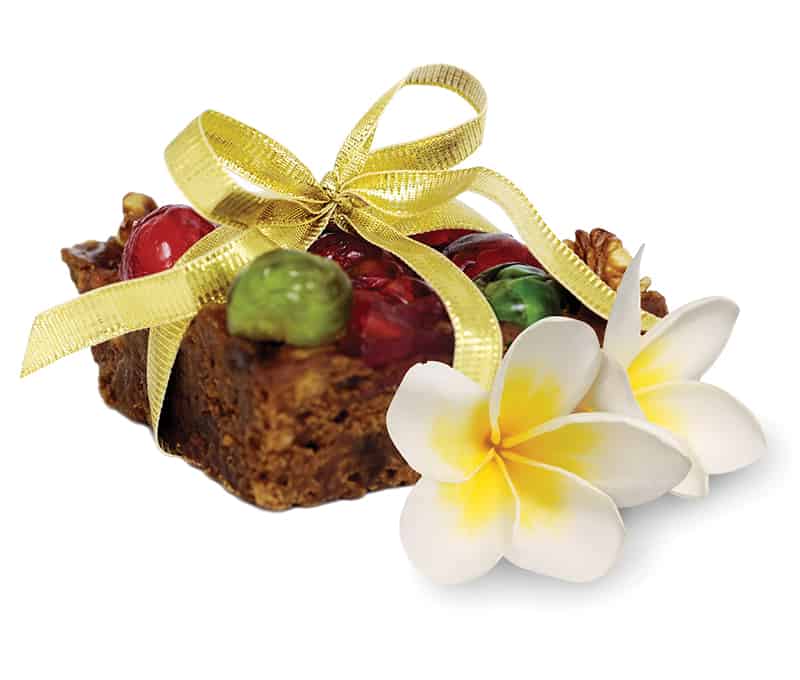Frangipani Paradise, Part II
More Frangipanis, Friends—And Fruitcakes
If you missed Part I of Frangipani Paradise or need to refresh your memory, CLICK HERE. We’ll wait for you. Hmmm, hmm-hmm… OK? Ready?
Comfy in the big Caddy we rolled for the border, two small flags fluttering from front bumper mounts—the nation’s colors and the ensign of the National Police. Outside so many manicured capitals, you pass through a reeking ring of shantytown slums into blighted countryside, searching for small pockets of imperiled paradise. Not this time. This was a blink-your-eyes and pinch-yourself tour.
Many homes were almost unbelievably tiny, but all had covered patios, open cooking hearths, arrays of tables and chairs—showing the people did much of their “living” outside. Sheds and animal shelters were spacious and livestock was plentiful; plots were large, well irrigated and carefully cultivated. Every village passed the “chickens, pigs and goats in balance” test, and these telling touches: trash and litter were conspicuously absent, and well-tended, colorful flowerbeds were the norm.
Fresh paint and whitewash were everywhere. Though most people obviously couldn’t afford the time and money to paint or re-paint everything at once, it was being done as and when they could. There was plenty of evidence of “poor but proud,” and nowhere were the signs I’d been trained to note—grinding, miserable poverty; fear of authorities; disease, hunger, hopelessness. Reactions to the government car were waves and smiles, not averted faces and suspicious glances.
We stopped repeatedly for happy, chattering flocks of schoolchildren, all neatly uniformed, remarkably scrubbed and groomed and all carrying books. If there is a single critical barometer of public well-being, I thought, this was it. The crowning touch came an hour later at market time. An elderly campesiña pushed a bicycle-wheeled cart. Atop a mound of fresh produce she had placed a pack of a dozen rolls of toilet paper—and she was smiling.
A Proper State of Tension
When we finally pulled off the dusty road onto the cobbles of our destination town, the driver said, “You may wish to roll down your window, sir,” and rolled down his own. That seemed only a little strange. He then very meticulously, and I thought, unnecessarily, backed up to a circle of small shops around a little fountain, so the Caddy faced the street. Watching his rear view mirror intently, he hesitated, then asked loudly, “Do you wish to go directly to your hotel, sir?” There was movement to my right rear, and a forced, gravelly voice barked.
“No! No grand hotel for this Yanqui dog! Let him sleep in the street!” What the heck? My window filled with the midsection of a uniformed man. I could only see his gun belt with holstered sidearm and a sort of mapcase or “man-purse” dangling from a leather strap. Then a hand grasped the window frame and as the man leaned down, a more mellow voice—one I recognized—said “Welcome, Connor! Did my conspiracy surprise you?” And there was the laughing face of Ramon. This was “El Commandante,” the district commander.
A few years past we had met at a class at Quantico, and being among the few married-and-faithful guys, we wound up studying, dining, shooting and working out together. Others were impressed with what a smooth and handsome dog he was. Ramon had the air of a bullfighter and the looks and grace of a Latin movie star. I was impressed with his knowledge of international relations, his mastery of languages and the breadth of his skill-set.
Only his title, not his name, had appeared on my travel papers. As he led me to his Jeep, he admitted that was his doing, to set me up for the surprise. He started to step in, then stopped, angrily stripped off that man-purse and flung it inside. I kidded him about it.
“Our minister’s wife,” he said, “Is a fashionista. She abhors bulging pockets, and ordered us to sew our pockets closed. This,” he tapped the bag, “she copied from one she bought in Paris, and spent much budget money on it. The minister may not even know of it. When her husband changes seats, these things will go to daughters and sweethearts and my wallet will go back in my pocket.” I filed that one under “Clues to Government Operations in Frangipani”—and “Fruitcake.”
Once in the Jeep, he wanted to know right away if his sources were correct; that no arms deal had been made with the US. I confirmed none had. He was relieved.
“Our arms are perfectly adequate,” he said. “Our officiales only want new arms because our neighbors have new arms. Theirs were generations behind ours, and now they are one generation behind us. But if our officials have new weapons, as in the past, they may look for or create opportunities to use them. We work to prevent that, partly, by keeping a proper state of tension.”
He saw the question on my face: Who are “we”?
The Face of the Enemy
At dawn, in front of Ramon’s border station between the river and the road, he pointed to a shirtless, muscular man fishing from the blasted abutment of a destroyed bridge about 150 meters distant. Behind him was the burned-out, thoroughly shot-up hulk of a vintage armored vehicle with a gun turret.
“That,” said Ramon, “Is the face of the enemy. My opposite number, district commander of their local forces—and my dear friend, as my grandfather and his father were lifelong friends. Our wives are related and our families are close. We, and people like us, preserve the proper tension. We may someday fight, if we must, over a real issue. But we two and many like us work to ensure it is never over egos or avarice.”
“Hola, Enrique!” he shouted. “The fishing is good today?” The man waved, quickly bent, hauled up a stringer with two huge fish on it—peacock bass or maybe golden dorado—and yelled back, “Excellent, Ramon! One is for you!” They both laughed. “You will meet him later, in uniform,” Ramon said. “A very good man.”
Ramon explained this “tension.” On this continent, he said, history was rife with wars and border conflicts, for good reasons and poor; men dying and peasants terrorized and uprooted, many times over paltry disputes, or to distract the people from governmental failures and excesses. When pressure approached explosive levels, sometimes a brief, minor—and hopefully bloodless—conflict could relieve that steam. Sometimes fighting had to happen.
“And when bullets start flying,” he said, “The officiales are absent. Someone must bravely remain in the capital to make stirring speeches and appear in photos, you understand?” I did.
To my left on the river were the blasted remains of an old water-powered mill building, later converted to a guard barracks. Dead ahead was that shot-up armored vehicle. With enough imagination one might envision a very short conflict in which one side fires HE rounds into a conveniently abandoned, worthless old structure, then the other side fires on an obsolete armored vehicle whose crew, quite fortunately and conveniently, had inexplicably bailed out and left it in the open scant moments before. Casualties? Perhaps one soldier suffers a compound leg fracture when an ammo crate falls from the back of a truck, and somehow, this becomes a “soldier horribly wounded while bravely repulsing the invading forces of …”
Both sides could claim innocence, victimization and victory; dramatic photos and brusque reports rushed to capitals and the “war zones” sealed to all but residents, “for security reasons,” until calm prevailed.
That’s silly. Pure fantasy, right? But the scent of frangipanis can be intoxicating, and fresh fruitcake can too.
Connor OUT



